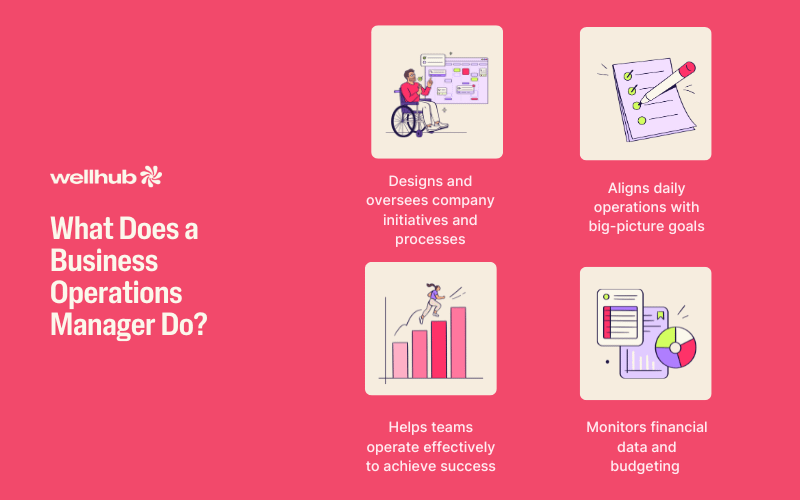12 Core Competencies of a Successful Business Operations Manager
Last Updated Jan 28, 2025

Every company wants to grow, but how do you achieve that while keeping daily operations running smoothly? It’s a delicate balance — your long-term strategy and the day-to-day of your business are obviously connected, prioritization can be tricky.
That’s where business operations managers come in. They make sure everything runs smoothly, from team dynamics to financial decisions—ultimately empowering CEOs and CFOs to focus on big-picture strategies.
Whether you’re a business leader or an aspiring operations manager, knowing what makes this role critical can help you build an effective management strategy.
What Does a Business Operations Manager Do?
A Business Operations Manager is an executive who designs and manages company initiatives and processes. These professionals align daily operations with big-picture goals so that everyone can be as effective as possible. Some of their primary duties include overseeing administrative staff and creating competitive strategies that boost efficiency.
Business operations managers are involved in all things organizational development. At their core, these executives are focused on optimizing business functions to help organizations grow strategically. Their responsibilities also include:
- Developing and refining workflows for workplace productivity and growth.
- Identifying and mitigating potential risks to operations.
- Leveraging performance management metrics for efficiency.
- Monitoring financial data and budgeting.
- Overseeing and conducting staff performance reviews.
Business Operations Managers often report directly to the CEO because of their involvement in long-term planning and decision-making. Through their strategies and data-driven insights, these leaders guide the overall growth and success of the business.

Core Competencies of a Successful Business Operations Manager
Given the wide-ranging responsibilities of Business Operations Managers, their skill sets are diverse. Here are 12 key competencies that make a manager stand out:
- Strategic Planning and Analysis
A Business Operations Manager doesn’t just manage today’s tasks—they anticipate tomorrow’s needs. This involves analyzing industry trends, understanding market dynamics, and continuously optimizing processes to stay ahead of the competition. By doing so, they create a strong foundation for informed decision-making, which drives efficient operations and long-term business success.
- Leadership and Team Management
Effective leadership is vital. Business Operations Managers inspire collaboration, foster open communication, and empower employees to excel in their roles. By building strong, motivated teams, they create a thriving culture where everyone works toward shared goals, boosting engagement and innovation across the organization. In turn, this bump in employee engagement can also increase performance and profitability, according to People Element.
- Financial Acumen
A deep understanding of financial management is crucial for making informed operational decisions. Business Operations Managers oversee budgets, track expenses, and ensure that resources are used efficiently. They are responsible for balancing costs while achieving business goals, which requires a strong grasp of financial forecasting, cost-benefit analysis, and risk management. This financial oversight ensures that projects stay on budget and contribute to the company’s overall profitability.
- Process Optimization
Organizations are built on effective procedures, making process optimization crucial for boosting productivity. A Business Operations Manager plays a key role in making this happen. These leaders streamline workflows by identifying bottlenecks, assessing current processes, and implementing improvements that lead to smoother, more efficient operations. This approach not only reduces operational costs but also enhances the quality and speed of work across departments. By continuously refining processes, they ensure the organization becomes more agile, scalable, and better equipped to meet customer demands.
- Project Management
Project management is a key competency that involves coordinating resources, managing timelines, and ensuring that deliverables are met on schedule. A Business Operations Manager must be skilled in project planning, task delegation, and risk management. They ensure that projects are executed efficiently, meeting both short-term objectives and long-term strategic goals. By balancing competing priorities, they help the organization maintain momentum and meet its operational targets.
- Data-Driven Decision Making
In today’s data-rich environment, decisions must be backed by accurate and actionable insights. Business Operations Managers rely on metrics to evaluate performance, identify areas for improvement, and make strategic decisions. They use data analytics to monitor KPIs, assess team efficiency, and predict future trends. This data-driven approach minimizes guesswork and ensures that every decision is based on facts, leading to better outcomes for the business.
- Communication
Clear and effective communication is critical to the success of any Business Operations Manager. They must convey complex ideas to diverse audiences, from executive teams to frontline employees. Whether they are presenting data, discussing strategy, or providing feedback, Business Operations Managers ensure that everyone is on the same page. Strong communication skills help build trust, resolve conflicts, and keep the organization aligned toward its goals.
- Technology Proficiency
As businesses evolve, so do the technologies that support them. Business Operations Managers must stay current with emerging tools and platforms that enhance productivity and streamline operations. They are often responsible for evaluating and implementing technology solutions that boost operational processes and keep organizations ahead of the curve.
AI, automation, and internet of things devices, for example, provide new ways to not only optimize operations but also anticipate future needs. By leveraging these tools, Business Operations Managers can help their organizations remain agile and forward-thinking.
- Customer and Client Focus
Strong client relationships are key to business success, and Business Operations Managers often play a role in fostering these partnerships. By understanding client needs and expectations, they ensure that the company delivers consistent value. Managing client relationships involves maintaining open lines of communication, resolving issues quickly, and delivering on promises. Satisfied clients not only contribute to immediate revenue but also support long-term business growth through loyalty and referrals.
- Adaptability and Flexibility
In a fast-paced business environment, adaptability is essential for responding to changing circumstances. Business Operations Managers must be flexible and open to new ideas, whether it’s adopting new technology, pivoting strategy, or managing unforeseen challenges. This ability to adapt keeps the company agile, enabling it to seize new opportunities and remain competitive. Being adaptable also means leading teams through change with confidence and clarity.
- Regulatory Compliance
Business Operations Managers play a crucial role in ensuring organizations adhere to relevant laws and industry standards, which can often shift over time. These specialists proactively monitor legislative changes and make necessary adjustments to operational processes, ensuring the company remains compliant. This not only helps avoid legal issues but also instills confidence in stakeholders and protects the organization’s reputation.
- Problem-Solving Abilities
Problem-solving is essential for Business Operations Managers to stay competitive. These managers excel at identifying the root causes of both day-to-day operational issues, such as workflow bottlenecks, and larger-scale challenges like supply chain disruptions or resource shortages. By proactively addressing problems through data collection and risk management, they implement solutions that not only resolve immediate issues but also prevent future disruptions, ensuring the business operates smoothly and efficiently.
Common Challenges of Business Operations Managers
While Business Operations Managers bring a wealth of skills to the table, enabling them to overcome the significant challenges that arise in their role. From managing limited resources to staying ahead of market shifts, they are constantly navigating obstacles that require quick thinking and strategic solutions. Common hurdles they have to surmount include:
- Market Volatility: Rapid changes in market conditions can make decision-making difficult. Staying informed through market research helps Business Operations Managers anticipate trends and adjust strategies accordingly.
- Resource Allocation: Balancing manpower, budget constraints, and project needs is often tricky. Effective Business Operations Managers assess resources thoroughly and prioritize tasks, negotiating for additional support when necessary.
- Team Management Obstacles: From resolving conflicts to addressing skills gaps, managing teams can be challenging. Business Operations Managers promote a positive culture and offer training opportunities to address these issues and keep teams engaged and productive.
By developing their skills in strategic thinking, risk management, and adaptability, Business Operations Managers successfully navigate these challenges and keep the organization moving forward.
What to Include in a Business Operations Manager Job Description
Having an effective job description is a strong talent acquisition strategy that can make all the difference when scoping out the best Business Operations Manager candidates. A job description that follows these guidelines is more likely to attract someone with powerful core competencies.
- Clear Job Title and Summary: Use a clear job title and provide a brief overview of the role, highlighting its significance within the organization.
- Key Responsibilities: Outline core responsibilities, such as strategic planning, process optimization, and resource management. Be specific to attract candidates with the right experience.
- Qualifications and Experience: Specify required qualifications and skills, such as financial acumen, leadership experience, and analytical capabilities.
- Soft Skills: Include essential soft skills, such as communication, adaptability, and problem-solving, which are critical for success in this role.
- Application Instructions: Clearly explain how to apply, and if applicable, outline the recruitment process and timelines.
A well-crafted job description ensures you attract qualified candidates who can meet the demands of this multifaceted role.
A Supported Workforce is an Efficient Workforce
Business Operations Managers are truly the jack-of-all-trades within an organization, balancing business strategies, cost savings, and workforce wellbeing. One of the smartest ways they can streamline processes and support their teams is by implementing effective wellness programs.
Wellness programs like Wellhub are a rich addition to employee benefits, especially health-related perks, and can significantly improve the bottom line. In fact, 78% of HR leaders found that their wellness programs reduce the cost of providing healthcare benefits.
Sound too good to be true? Speak with a Wellbeing Specialist today to discover how wellness programs can help optimize your organization!

Company healthcare costs drop by up to 35% with Wellhub*
See how we can help you reduce your healthcare spending.
[*] Based on proprietary research comparing healthcare costs of active Wellhub users to non-users.
You May Also Like:
- HR Department Structure: Roles, Functions, and 4 Common Structures
- 11 HR Best Practices to Keep You Ahead of the Curve
- What are the Essential HR Functions?
Resources:
- Engagement Trends Annual Report 2023. People element. Retrieved December 11, 2023, from https://peopleelement.com/wp-content/uploads/2023/06/People-Element-2023-Engagement-Report-Final-1.pdf
- Wellhub. (2023, October 18). The State of Work-Life Wellness 2024. https://wellhub.com/en-us/resources/research/work-life-wellness-report-2024/
Category
Share

The Wellhub Editorial Team empowers HR leaders to support worker wellbeing. Our original research, trend analyses, and helpful how-tos provide the tools they need to improve workforce wellness in today's fast-shifting professional landscape.
Subscribe
Our weekly newsletter is your source of education and inspiration to help you create a corporate wellness program that actually matters.
Subscribe
Our weekly newsletter is your source of education and inspiration to help you create a corporate wellness program that actually matters.
You May Also Like

Vision Statement: Examples and Tips For Writing One | Wellhub
Leverage these tips to write a powerful vision statement that shapes your company's goals and culture, creating a lasting business impact.

Business Management: Skills, Benefits, and Strategies
Use these tips to improve business management skills, enhance employee engagement, and build a stronger foundation for organizational success.

Profit and Loss Statement: Key Elements, Analysis Tips | Wellhub
The P&L is a financial snapshot of a business's income and expenses over time. Unlock the key to strategic decision-making.